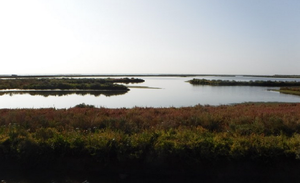World Wetlands day
On February 2, World Wetlands Day to increase awareness on the important role that these areas have for the people and the Plante. The wetland, such as lagoons, are between the environment most productive, with an high level of biological diversity.
Also this year the LIFE Lagoon Refresh project continues its restoration actions in an area of the northern lagoon of Venice to re-establish the saline gradient and improve the quality and conservation status of the lagoon habitats and the species that live there.
The project Life Lagoon Refresh - Coastal lagoon habitat (1150*) and species recovery by restoring the salt gradient increasing fresh water input started in September 2017 and will end in 5 years.
To date, the project is moving towards an end, the concrete actions are completed, while the reed bed transplantation and monitoring activities are still in progress. The monitoring results show a change in the project area: the saline gradient, the key objective of the project, has been restored; flora and fauna are responding to the change in salinity. ISPRA and the University of Venice continue to collect data to verify if the objectives of the project have been achieved.
- https://development.isprambiente.gov.it/en/archive/news-and-other-events/ispra-news/2022/01/world-wetlands-day
- World Wetlands day
- 2022-02-02T00:00:00+00:00
- 2022-02-02T23:59:59+00:00
- On February 2, World Wetlands Day to increase awareness on the important role that these areas have for the people and the Plante. The wetland, such as lagoons, are between the environment most productive, with an high level of biological diversity. Also this year the LIFE Lagoon Refresh project continues its restoration actions in an area of the northern lagoon of Venice to re-establish the saline gradient and improve the quality and conservation status of the lagoon habitats and the species that live there. The project Life Lagoon Refresh - Coastal lagoon habitat (1150*) and species recovery by restoring the salt gradient increasing fresh water input started in September 2017 and will end in 5 years. To date, the project is moving towards an end, the concrete actions are completed, while the reed bed transplantation and monitoring activities are still in progress. The monitoring results show a change in the project area: the saline gradient, the key objective of the project, has been restored; flora and fauna are responding to the change in salinity. ISPRA and the University of Venice continue to collect data to verify if the objectives of the project have been achieved.
- What evidence
- When Feb 02, 2022 (GMT+0 / UTC0)
-
Add event to calendar
iCal

